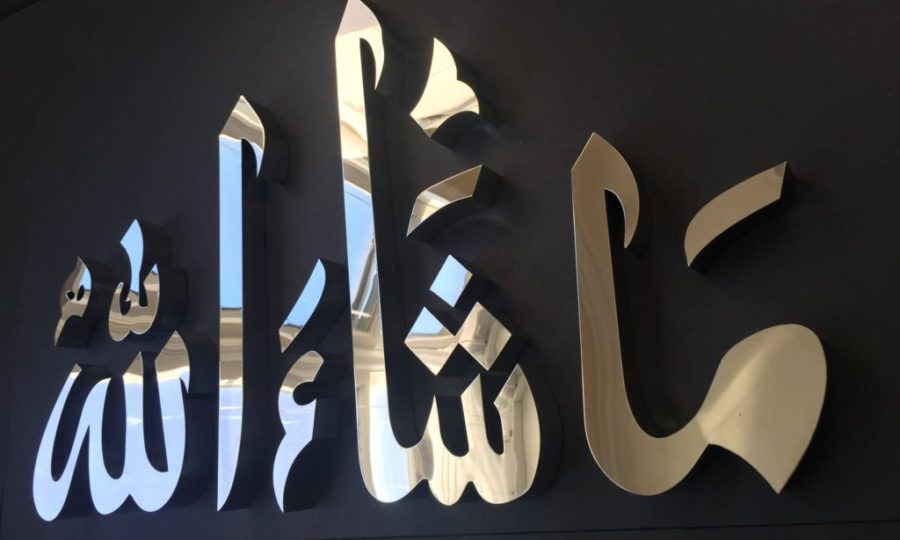
“MASHALLAH” – THE PHRASE THAT GIVED THE NAME TO THE CRATER ON THE MOON
Among Muslims, the phrase MashaAllah is used to express admiration, surprise, satisfaction, and even protection from the evil eye.
The phrase “mashaAllah” in Arabic means “As Allah wills; whatever Allah wills will be.” A similar meaning is, for example, in the hadith “What Allah wills will be, and what He does not will will not be” (Abu Dawood, Adab, 101). This phrase is also found in four verses of the Qur’an.
The Messenger of Allah (peace be upon him) instructed to say: “MashaAllah la quwwata illa billah” (“It will be as Allah wills, there is no strength except for Him”) (Bayhaki, Shuabu al-iman, IV, 90) every time a person sees something beautiful. He also advised in the morning, getting out of bed or going to bed, to say: “MashaAllahu kan wa ma lam yasha lam yakun” (“What Allah wishes will be, and what He does not wish will not be”) (Abu Dawood, Adab , 101).

Source: islamansiklopedisi.org.tr
“Masha’Allah” is used mainly in relation to something that has already happened or already exists. In this it differs from the phrase “InshaAllah”, which has a similar meaning “As Allah wills”, but applied in relation to the future, expressing the hope that something, if it is the will of Allah.
In the daily speech of Muslims, the phrase “MashaAllah” is used in the sense of “How beautiful!”, “How wonderful!”. In addition, it serves to express surprise or satisfaction. But its most common use is as a protection against the evil eye. When expressing admiration for something, such as a beautiful child, it is considered good manners to add “MashaAllah” to protect against the evil eye, or to prevent people from thinking that you are jealous. For similar purposes, there is a tradition among Muslims to put on children or hang on beautiful houses and other structures amulets with the inscription “MashaAllah”. Interestingly, non-Muslims did not shy away from it either. For example, in Turkey, above the entrance to the now abandoned church of the Karamanlids (a Turkic-speaking ethnic group of the Greek Orthodox faith) in the city of Injesu, you can see the inscription ΜΑΣΑΛΑΧ (“mashaAllah”).

Inscription above the entrance to the now abandoned Karamanlid Church in the city of Injesu / Source: de.wikipedia.org
The phrase has entered the spoken language of many Muslim peoples, for example, Indonesians, Malays, Persians, Turks, Kurds, Bosnians, Azerbaijanis, Somalis, Chechens, Avars, Circassians, Bangladeshis, Tatars, Albanians, Afghans, Pakistanis and others. It is also used by some Christians in the regions that were part of the Ottoman Empire. Serbs, Christian Albanians, Bulgarians and Macedonians say “Mashala” (“mašala”), meaning “a job well done”. In a similar sense, this phrase is used among part of the Georgians, Armenians, Pontic and Cypriot Greeks and Sephardi Jews.
The expression “MashaAllah” has also turned into a male name. It is common in Iran, Azerbaijan and other Muslim countries. And the Dubai prince Ahmad al-Maktoum named his horse so. The real name of the famous Persian-Jewish astrologer of the 7th century from Basra Mashallah ibn Asari al-Basri was Menasseh. But fame, including in Europe, he received under the name Mashallah or Messahalla, Messahalah, Messala. In honor of him, a large ancient crater in the northeastern mainland region of the visible side of the moon was named Messala (lat. Messala), which is a distorted version of his Arabic name MashaAllah.
Islamosphere
SOURCE:https://islamosfera.ru/mashaallax-fraza-davshaya-nazvanie-krateru-na-lune/

